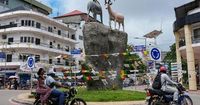Polls closed Sunday in Guinea after a tense and closely watched constitutional referendum that could reshape the West African nation’s political future. The vote, held on September 21, 2025, may open the door for the country’s military junta leader, General Mamady Doumbouya, to run for president, stirring both hope and anxiety among citizens and observers alike.
According to AFP, around 6.7 million registered voters were eligible to cast their ballots in a process that has been anything but ordinary. The referendum, which proposes a new constitution to replace the current transitional charter, could lift the ban on junta leaders – like Doumbouya himself – from seeking the presidency. For many, this is a pivotal moment: a possible step toward civilian rule, but also, critics say, a calculated move to legitimize continued military dominance.
Despite the opposition’s calls for a boycott, voter turnout appeared substantial in Conakry’s affluent districts as well as working-class neighborhoods. In central Conakry, residents lined up before dawn, dressed in their finest, to make their voices heard. Mabinty Kalabane, a 23-year-old baker voting for the first time, told OneIndia, “I feel proud. I feel 100 percent Guinean, thanks to this card,” referring to her voting card. She had read parts of the draft constitution and decided to vote “yes.”
The atmosphere at polling stations was a blend of festivity and unease. While some voters expressed optimism, the heavy presence of security forces was impossible to ignore. The government deployed 45,000 personnel equipped with armored vehicles and combat helicopters nationwide to oversee the vote, as reported by AFP. Tanks and military barricades stood as stark reminders of junta rule, even as the day’s events unfolded peacefully in most areas.
The vote counting began Sunday evening, and provisional results are expected by Tuesday, September 23, 2025, according to election officials. The Directorate General of Elections – led by two officials appointed by Doumbouya – organized the referendum. For the constitution to pass, a minimum turnout of 50 percent is required.
The stakes are high. Guinea, like its neighbors Mali, Niger, and Burkina Faso, has experienced recent military takeovers. Doumbouya’s junta seized power in 2021 by ousting the elected president, Alpha Conde, after accusing him of failing to deliver on promises and risking national chaos. At the time, Doumbouya pledged to restore civilian government by the end of 2024. But as 2025 draws to a close, the transition appears far from straightforward.
The draft constitution at the heart of the referendum introduces sweeping changes. If adopted, it would not only allow junta members to run for office but also extend presidential terms from five to seven years, renewable twice. It would create a Senate and permit independent candidates to enter elections – reforms that, on paper, could strengthen Guinea’s democratic institutions. Fanta Conte of Guinea’s National Transition Council emphasized that the referendum is meant to empower the legislative branch rather than serve Doumbouya’s ambitions.
Yet, many Guineans and international observers remain skeptical. Opposition groups have denounced the vote as a charade designed to cement military rule. Over 50 political parties were dissolved last year, and just weeks before the referendum, three main opposition parties were suspended, effectively silencing dissenting voices. Rafiou Sow, president of the opposition Renewal and Progress Party, lamented to OneIndia, “Our activists and supporters have no knowledge of this constitution. We are forbidden even to speak.” He pointed out that more than half of Guinea’s population is illiterate, leaving many voters reliant on information from the pro-constitution “yes” camp.
The junta’s methods for maintaining control have drawn criticism. Since 2022, demonstrations have been banned, opposition leaders have been arrested or forced into exile, and several media outlets have been shut down. Journalists, too, have faced arrest. In August 2025, two major opposition parties were suspended, further narrowing the space for political debate. One 28-year-old computer scientist, speaking anonymously, described the election as “outrageous” and cited shrinking freedoms under military rule.
Despite these tensions, some citizens see the referendum as a chance for stability and progress. A 72-year-old union representative, who voted “yes,” told AFP she hopes to see the end of military rule but criticized the overwhelming propaganda and military presence during the campaign. “There was more intimidation than real constitutional debate,” she said, echoing concerns about the fairness of the process.
General Amara Camara, Secretary-General of the Presidency, has insisted that the proposed constitution reflects the aspirations of the Guinean people, not just Doumbouya’s personal ambitions. The military government has promised both presidential and legislative elections before the end of 2025, though no specific dates have been announced. Elections are now anticipated in December, but the lack of clarity fuels further uncertainty about Guinea’s democratic future.
For many Guineans, the referendum is about more than politics – it’s about daily survival. The World Food Program reports that, despite Guinea’s rich natural resources, over half of the country’s 15 million people live in poverty and face food insecurity. Ibrahima Sory Diallo, a clothes seller in Conakry’s Kaporo-Rails suburb, told OneIndia, “It’s not going well in the country. Everyone is suffering.” Still, some voters, like university graduate Tiguidanké Guirassy, are inspired by Doumbouya’s progress in infrastructure and believe the new constitution could bring prosperity.
The international community has made clear its preference for a return to civilian leadership. A 44-year-old voter interviewed by AFP emphasized this point, while also expressing hope that the referendum would mark the end of military rule. But the path forward remains fraught with challenges, especially given the junta’s track record of suppressing dissent and controlling the political narrative.
As Guinea awaits the results of the referendum, the country stands at a crossroads. Will the new constitution pave the way for a genuine transition to democracy, or will it simply entrench military power under a veneer of legitimacy? For now, Guineans can only watch and wait, hoping their voices – however constrained – will shape their nation’s future.


